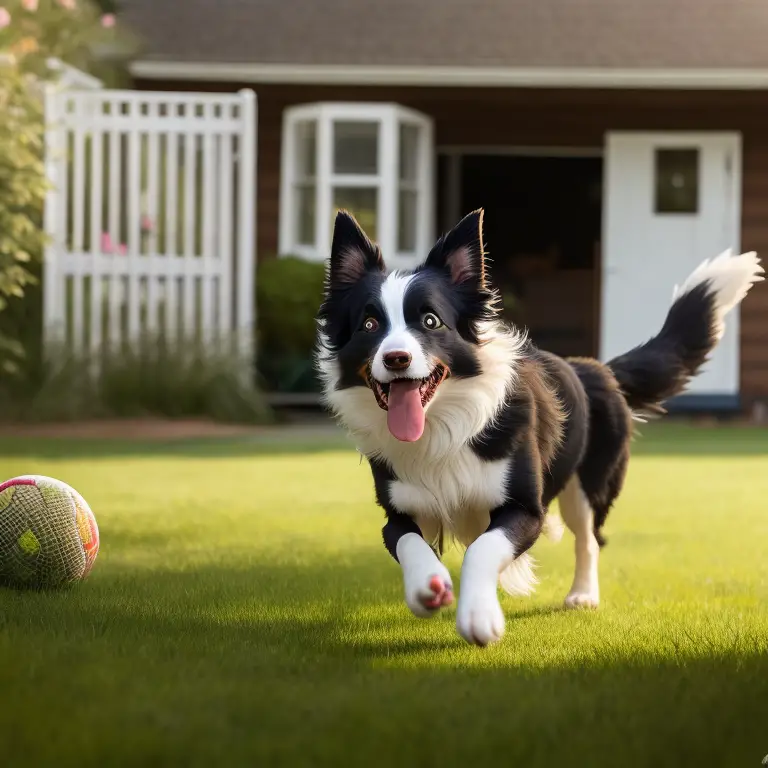Can Border Collies Be Trained To Be Therapy Dogs?
Therapy dogs can have a significant positive impact on people’s lives, providing emotional support and companionship in various settings. However, not all dog breeds are equally suitable for this role.
In this article, we’ll explore whether Border Collies, renowned for their high energy and working drive, can be trained to be effective therapy dogs.
We’ll take a closer look at their characteristics, potential challenges in training, steps to prepare them for therapy work, benefits of using them as therapy dogs, and finally, some inspiring success stories. So, let’s dive in and see if Border Collies have what it takes to bring comfort and joy to those in need.
| Question | Answer |
|---|---|
| What is a therapy dog? | A therapy dog is a dog trained to provide comfort and affection to people in hospitals, retirement homes, schools, and other settings. |
| What breeds make good therapy dogs? | Dogs with calm, friendly, and gentle personalities are usually the best candidates. Golden Retrievers, Labrador Retrievers, Poodles, and Boxers are popular choices. |
| Can Border Collies be trained to be therapy dogs? | Yes, Border Collies can be trained to be therapy dogs. They are intelligent, sensitive, and intuitive dogs that can provide support and comfort to people in need. |
| What are the benefits of using a Border Collie as a therapy dog? | Border Collies are highly trainable and adaptable dogs that can perform a variety of tasks in different environments. They also have a calming and soothing presence that can help people relax and feel better. |
| What are the challenges of using a Border Collie as a therapy dog? | Border Collies are high-energy dogs that need a lot of exercise and mental stimulation. They may become bored or restless if they are not given enough opportunities to work and play. They may also be too sensitive or reactive to certain stimuli, such as loud noises or sudden movements. |
Can Border Collies make good therapy dogs?
Characteristics of Border Collies that make them suitable for therapy work
Border Collies possess several characteristics that make them highly suitable for therapy dog work. These dogs are intelligent, loyal, and have an excellent work ethic.
Border Collies are also highly responsive and trainable, making them an excellent choice for therapy work.
They can quickly learn different commands and adapt to different environments, situations, and people. These dogs are incredibly energetic and love to play, which is ideal for therapy work.
They can energize the patients and bring joy to their lives.
Border Collies are also incredibly gentle, which is essential in therapy work. They are aware of their gentle touch and can interact with individuals quickly; they are also highly sensitive to the body language of the people around them.
Border Collies possess great empathy, and they can sense the emotions of others.
These dogs are also highly intuitive, meaning that they can effectively read people’s emotions and respond to them. Overall, Border Collies are an excellent choice for therapy work due to their unique combination of intelligence, loyalty, energy, and gentleness.
Potential challenges in training Border Collies as therapy dogs
Training Border Collies as therapy dogs is not without its challenges. Here are some potential obstacles you may face:
- Overstimulation: Border Collies have a high energy level and can become easily overstimulated in unfamiliar environments. This can lead to difficulties in controlling their hyperactive nature, making it hard for them to remain calm and focused in therapy situations.
- Herding instincts: Border Collies have an innate instinct to herd and can become possessive and pushy. It may take extra effort to train them to understand that humans are not to be herded or controlled in any way, as this could be dangerous.
- Sensitivity to stimuli: Border Collies are incredibly perceptive and sensitive to their surroundings. Negative stimuli such as harsh words, loud noises, or stressful situations could affect their behavior and make it difficult for them to perform within a therapy environment.
- Separation anxiety: Border Collies are prone to develop separation anxiety. They may become overly attached to their owners or handlers and may struggle if separated from their support system in a therapy setting.
These challenges can be overcome with proper training and adequate socialization, and it is essential to remain patient with the process. Despite these potential obstacles, Border Collies have many unique qualities that make them excellent candidates for therapy dog work.
Steps to train Border Collies as therapy dogs
Socialization and obedience training
Socialization and obedience training are crucial steps in preparing Border Collies for their role as therapy dogs. Early socialization helps them to become friendly, confident, and comfortable in a variety of settings, including hospitals, schools, and nursing homes.
Obedience training ensures that they respond well to commands from their handlers, and exhibit appropriate behavior in different situations.
Socialization involves introducing Border Collies to different people, noises, and surroundings, so they learn how to be calm and relaxed in unfamiliar situations. It is essential to start socialization at an early age and gradually expose them to new experiences.
Obedience training helps Border Collies develop manners and self-control, such as not jumping on people, barking excessively, or pulling on a leash.
Training classes can be an excellent way to socialize and train Border Collies. They provide opportunities for interaction, exposure, and feedback from trainers and other dogs’ owners.
Positive reinforcement training, such as using treats and praise, is effective in training Border Collies.
It strengthens the bond between the dog and handler and ensures that the dog enjoys the training process. In summary, socialization and obedience training are essential steps in preparing Border Collies for their role as therapy dogs.
These steps help them develop the skills and confidence they need to interact with people of different ages and backgrounds in a calm and controlled manner.
With proper training and socialization, Border Collies can excel as therapy dogs and bring joy and comfort to many people.
Advanced training for therapy work
Advanced training for therapy work involves further refining the dog’s skills to meet the specific needs of patients. This training includes teaching the dog to remain calm and patient in stressful situations, maintain attention for long periods, respond to a wide range of commands, and interact appropriately with patients.
Some advanced training techniques that can be used for Border Collies include scent training, where the dog is taught to identify particular scents to alert handlers to specific medical conditions, and task training, where the dog is taught to perform tasks that can help patients with physical disabilities.
It is essential to work with a professional dog trainer who has experience with therapy work and can design and implement a training program that meets the specific needs of your Border Collie. Keep in mind that advanced training can take time and requires patience and persistence.
But with proper training and socialization, a Border Collie can become a fantastic therapy dog that provides emotional and physical support to patients in need.

Certification and registration requirements
Certification and registration requirements are necessary to ensure that Border Collies are able to perform their therapy roles well. The requirements vary depending on the organization, but generally, dogs need to pass a series of evaluation tests and complete a certain number of hours of training and practice.
To become registered, dogs also need to be vaccinated, microchipped, and insured.
Owners may need to undergo a background check and attend training sessions. It is important to note that not all therapy organizations require certification or registration, but having these can increase your dog’s chances of being accepted into a program.
Before choosing an organization, it is important to research and ensure that it has a good reputation and meets your needs and your Border Collie’s temperament.
Certification and registration can be challenging, but it is a necessary step in ensuring that your Border Collie is well-equipped and trained to assist others in their therapy work.
Benefits of using Border Collies as therapy dogs
Physical and emotional benefits
Border Collies have been shown to provide many physical and emotional benefits as therapy dogs. Here are some of the ways they can positively impact patients and those in need:
- Physical benefits: Interacting with a therapy dog like a Border Collie can help reduce blood pressure, heart rate, and alleviate stress. They can also help with physical therapy, such as encouraging mobility and increasing overall activity levels.
- Emotional benefits: Therapy dogs like Border Collies can help improve mood, reduce anxiety and depression, and provide a sense of comfort and companionship. They can also help with socialization, boosting self-esteem and providing a source of unconditional love and support.
Overall, the unique skills and personalities of Border Collies make them great therapy dogs, capable of providing a range of both physical and emotional benefits to those in need.

Unique skills of Border Collies in therapy work
Border Collies possess unique skills that make them ideal therapy dogs. Here are some of the unique skills that they bring to therapy work:
- Intuitive: Border Collies are highly intuitive and can sense when their owners, patients, or therapy partners are feeling down or distressed. They have a natural inclination to provide comfort to those who are in distress.
- Affectionate: Border Collies are very affectionate dogs, and they are extremely loyal to their owners. They are known to form deep connections with their owners and therapy partners, which provides a sense of comfort and security.
- Energetic: Border Collies are high-energy dogs, which makes them great for certain types of therapy work. They can keep up with children and adults who are mobile and need a therapy partner who can match their energy level.
- Focused: Border Collies are highly trainable, and they can focus intensely on the task at hand. This is beneficial in therapy work as they can follow commands and behave appropriately in various therapeutic contexts.
- Problem-Solvers: Border Collies are excellent problem-solvers and can figure out solutions to complex situations. This quality can be useful in therapy work, where they are required to think on their feet to help their therapy partners.
Overall, Border Collies are exceptional therapy dogs because of their unique skills. They bring a special kind of comfort and support to patients, therapists, and care facilities.
Success stories and case studies
Real-life examples of Border Collies serving as therapy dogs
Border Collies have been trained to serve as therapy dogs around the world, and there are a few real-life examples to prove their success.
- ) In a hospital in Colorado, USA, a therapy Border Collie named Joey assisted in physical therapy sessions for children with special needs, improving their mobility and overall well-being.
- ) In the UK, a Border Collie named Dexter has been regularly visiting a hospice to offer comfort and support to terminally ill patients.
- ) Another therapy Border Collie named Trooper has helped patients with post-traumatic stress disorder at a center in Pennsylvania, USA.
These therapy dogs have shown great success in helping patients cope with physical, emotional, and mental challenges. They are great at reducing stress, anxiety, depression, and loneliness.
Border Collies excel in obedience training, which makes them great therapy dogs.
In the next section, let’s discuss the various steps involved in training Border Collies as therapy dogs.
Impact of Border Collies on patients and therapists
Let’s jump straight into the impact that Border Collies have on patients and therapists in therapy work. In numerous case studies and success stories, Border Collies have shown tremendous benefits in aiding patients in their therapy sessions.
These dogs provide a calming and soothing presence, which helps patients feel more relaxed and less anxious during their therapy sessions.
Therapists have also reported feeling more at ease and less tense when working with Border Collies. These dogs have an uncanny ability to sense the emotions of their human counterparts, creating a comforting atmosphere for both the patient and therapist.
Border Collies have been used in therapy sessions to assist patients with physical and mental disabilities, as well as those suffering from anxiety, PTSD, and depression.
In these cases, the dogs provide a sense of purpose and motivation for patients, ultimately helping them achieve their therapy goals more effectively. Overall, the impact of Border Collies on patients and therapists is undeniable.
These dogs demonstrate the unique ability to connect with and support individuals during difficult times, making them excellent candidates for therapy work.

Conclusion
Border Collies are well-suited to serve as therapy dogs with proper training and socialization. Their intelligence, obedience, and unique skills make them a valuable asset in therapy work, providing physical and emotional benefits to patients and therapists alike.
While there may be challenges in training Border Collies, the rewards of their service are immeasurable.
Real-life success stories demonstrate the positive impact they have on those they serve. If you are considering training a therapy dog, consider the suitability of a Border Collie.
With patience and dedication, your furry companion may be able to bring joy and healing to those in need.







